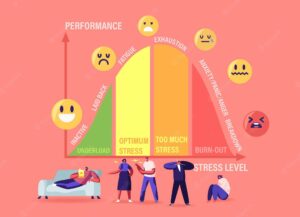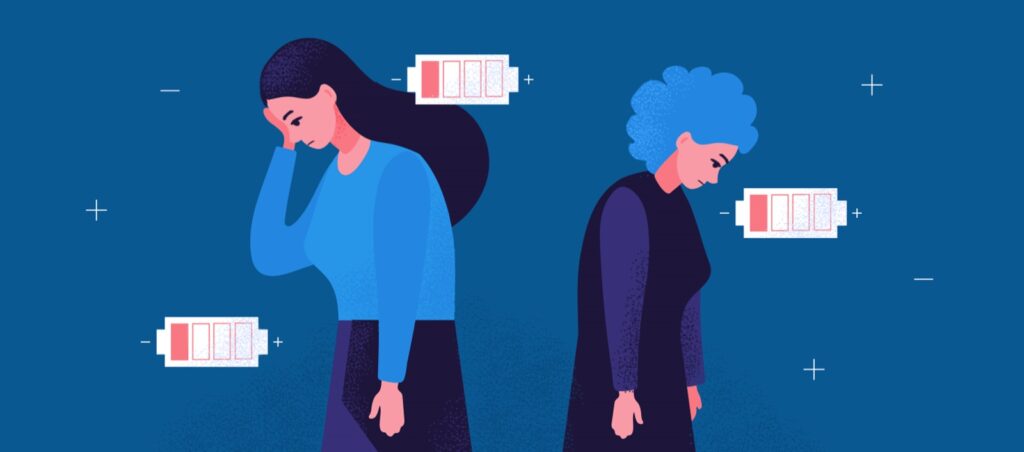Do you feel overwhelmed and exhausted? Are you struggling to balance work, family, and social obligations? If so, you’re not alone. Anxiety and fatigue are common problems that many people face. In this blog post, we will discuss some tips for managing anxiety and fatigue. We will also provide advice for creating a healthy lifestyle balance.
Contents
What Are Anxiety And Fatigue?
Anxiety attacks lead to a quick release of hormones that can leave you feeling exhausted and makes it difficult to concentrate. It can also zap your energy, which can make it hard to do anything but worry.
Fatigue is a feeling of tiredness that doesn’t go away with rest. It can be caused by stress, anxiety, depression, and other mental health conditions. Fatigue can also be physical, such as when you have a chronic illness or you’re not getting enough sleep.
Anxiety and fatigue can be difficult to distinguish from one another. Anxiety is often characterized by feelings of worry, tension, or restlessness, while fatigue is usually accompanied by low energy levels and a general sense of exhaustion.
How Are Anxiety And Fatigue Linked?

Anxiety spikes your hormone levels, which can lead to fatigue. When you’re anxious, your body is in “fight-or-flight” mode. This means that your body is preparing to either run away from or face a perceived danger. This response uses a lot of energy, which can leave you feeling tired. Anxiety is a feeling of nervousness.
The relationship between anxiety and fatigue is linked because when you experience anxiety, your body is in a heightened state of alertness. This causes your body to release hormones like adrenaline and cortisol. These hormones can lead to physical symptoms such as increased heart rate and sweating.
Additionally, the link can be explained by the fact that both anxiety and fatigue can be caused by chronic stress. When you’re under chronic stress, your body is in a constant state of “fight-or-flight.” This can lead to physical symptoms like headache, muscle tension, and difficulty sleeping. It can also lead to fatigue.
Feeling weary is a typical bodily reaction to stress and anxiety that happens often. Anxiety and fatigue can present themselves in several ways, such as feeling drained of energy, lacking motivation, or even physical strength.
If worrying or feeling stressed is a regular experience for you – whether it’s from an upcoming test, conflict, or bill. It is important to find ways to manage these conditions.
Does Anxiety Cause Extreme Fatigue?
It is often said that anxiety can cause extreme fatigue. This is not always the case, however. While anxiety can certainly lead to some degree of fatigue, it is usually not the only factor at play. In most cases, anxiety is just one piece of the puzzle.
Many factors can contribute to feelings of anxiety and fatigue. These include:
Exhaustion of the Mind
This is one of the most common causes of anxiety and fatigue. The mind is constantly racing, thinking about all the things that need to be done. This can lead to mental exhaustion, which can then lead to physical fatigue. In fact, many people with anxiety disorders find that they need to take breaks during the day just to rest their minds.
Physical Illness or Injury
Another common cause of anxiety and fatigue is physical illness or injury. When the body is not functioning properly, it can lead to feelings of anxiety and fatigue. This is often seen in people with chronic illnesses or who have suffered traumatic injuries. If you are experiencing anxiety and fatigue due to physical illness or injury, it is important to seek medical help.
Hormonal Imbalance
An imbalance of hormones can also contribute to anxiety and fatigue. This is often seen in women who are going through menopause or perimenopause. When estrogen levels drop, it can cause a decrease in serotonin, which can lead to anxiety and depression. In addition, fatigue is a common symptom of menopause.
Sleep Disturbance
Changes in sleep patterns can also cause or worsen anxiety and fatigue because when you’re not rested, your body’s systems aren’t working optim patternsally. This can lead to feeling more anxious and stressed, as well as physically exhausted. To help balance your life when you’re feeling overwhelmed, it’s important to get enough sleep.
Other factors
Other factors can contribute to anxiety and fatigue. For instance, these are as follows:
- Poor diet
- Lack of exercise
- Chronic stress
All of these can lead to an imbalance in the body and mind, which can then contribute to anxiety and fatigue. Therefore, it’s important to address all of these factors to achieve a healthy balance.
What Are Symptoms Of Anxiety And Fatigue?
There are various symptoms of fatigue, which are listed below:
- Tiredness
- Lack of energy
- Headache
- Irritability
- Difficulty concentrating
- Dizziness
- Muscle aches and pains
- Blurry vision
- Low motivation
- Appetite loss
- Chronic tiredness
- Hallucinations
- Reduced ability to pay attention to things
- Moodiness, such as feeling irritable
These are some symptoms that are related to anxiety and fatigue.
It is important to remember that not everyone experiences the same symptoms. These symptoms can be managed with the help of a therapist or doctor.
How To Diagnose Anxiety And Fatigue?
Diagnosing fatigue can be difficult but if any of the symptoms can be found, it is important to look for a cause. Many people with anxiety disorders also suffer from fatigue. The two can be linked, as anxiety can lead to sleep problems, which in turn can lead to fatigue.
To diagnose fatigue, your doctor may run several tests, including
- Medical history review: a doctor may examine various events such as childbirth, pregnancy, job changes, or other stressful life events that may have contributed to your fatigue.
- Psychological assessment: a doctor may ask about your mood, any thoughts of suicide or self-harm, and assess whether you’re under a lot of stress.
- Sleep habits review: a doctor may ask about your sleep patterns, and how much sleep you’re getting each night.
- Blood tests: a doctor may order blood tests to check for anemia, thyroid problems, or other conditions that can cause fatigue.
- Imaging tests: in some cases, a doctor may order imaging tests of the brain or adrenal glands.
Once a diagnosis is made, your doctor can work with often you wake up during the night, and how rested you feel when you wake up in the morning. If your fatigue is due to an underlying medical condition, treating the condition may help improve your fatigue. If your doctor suspects your fatigue is due to anxiety, they may refer you to a mental health professional for treatment.
How Do You Overcome Anxiety Fatigue?

Anxiety and fatigue can be difficult to manage, but there are some things you can do to help balance your life.
Here are some tips:
- Get regular exercise: Exercise can help improve your sleep, increase energy levels, and reduce stress.
- Yoga, Tai Chi, and other forms of relaxation: These activities can help you relax and ease anxiety.
- Join a support group: Connecting with others who have similar experiences can be helpful.
- Take breaks during the day: When you’re feeling overwhelmed, take a few minutes to yourself to relax and rejuvenate.
- Practical Lifestyle Changes: There are various lifestyle changes that one must do in his lifestyle to cope with anxiety and fatigue.
- Set a regular sleep schedule: Go to bed and wake up at the same time each day to help regulate your body’s natural sleep rhythm.
- Limit caffeine and alcohol: Caffeine and alcohol can interfere with sleep, so it’s best to limit them in the evening.
- Eat a healthy diet: Diet is always essential for your body eating nutritious food and healthy diet can help to cope with anxiety and fatigue.
- Set realistic goals: When you’re trying to do too much, it can lead to stress and anxiety. Set realistic goals for yourself, and take things one step at a time.
- Make time for yourself: Be sure to schedule some “me” time into your day. Do something you enjoy, such as reading, taking a bath, or going for a walk.
These are some tips you can manage your anxiety and fatigue. Self-help can be a great way to ease your symptoms, but it’s important to seek professional help if your symptoms are severe or interfering with your daily life. If you think you may be suffering from anxiety or fatigue, talk to your doctor. They can help you make a plan to manage your symptoms and get on the road to recovery.
Professional Treatment
A therapist can help you develop healthy coping mechanisms and work through the root causes of your anxiety. If your fatigue is caused by a medical condition, treatment will be necessary to manage the underlying condition.
For example, in anxiety and fatigue, both physical and psychological therapies may be recommended. Physical therapy can help you learn how to manage your fatigue, while psychological therapy can help you understand and cope with your anxiety. In some cases, medication may also be necessary to manage symptoms.
Therefore, professional help can be vital in managing anxiety and fatigue. If you think you may be suffering from either of these conditions, talk to your doctor. They can help you make a plan to get on the road to recovery. With the right treatment, you can manage your symptoms and live a healthy, balanced life.
Conclusion
It can be concluded that anxiety and stress are the main causes of fatigue. Fatigue can be caused by various factors such as divorce, separation, low social class, and poor health status. Anxiety and stress need an appropriate intervention to be solved. The first step to do is to find the main causes of anxiety and stress. After that, try to solve it with some relaxation techniques or therapy.
For further information and suggestions, please contact Therapy Mantra. We have a team of expert therapists that can help you overcome this problem. Get in touch with us right away to learn more about our services. You may also make an online therapy session or download our free Android or iOS app.


